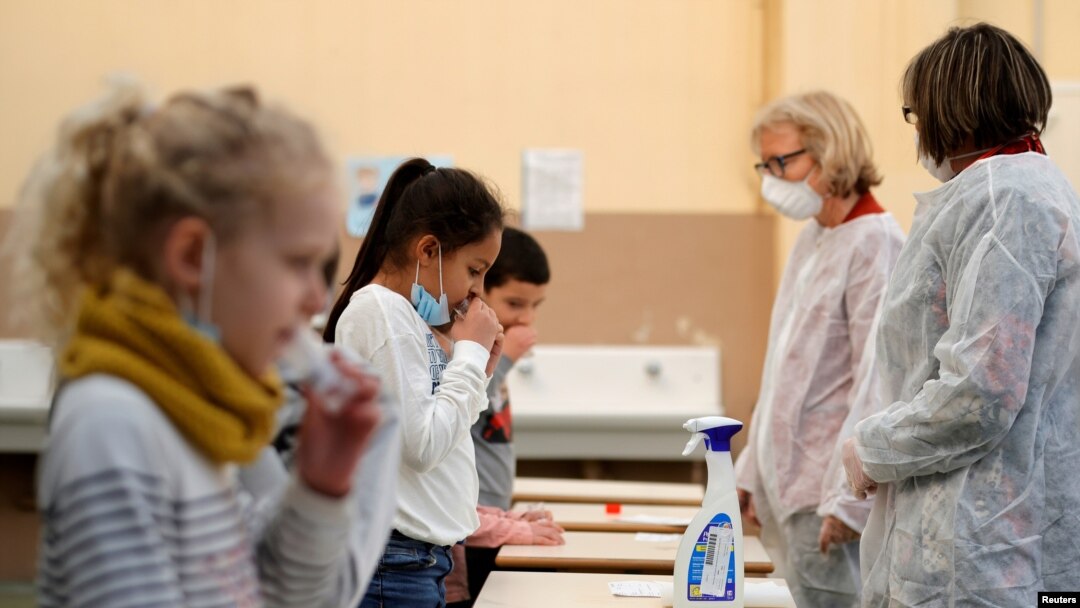U.S. pharmaceutical firm Pfizer says its COVID-19 vaccine developed with German-based BioNTech is safe and effective for children between 12 and 15 years old, a major development that could lead to all schools in the U.S. fully reopening later this year.
The two companies announced Tuesday that a clinical trial involving over 2,200 children showed that none of the children who received the vaccine were infected with the coronavirus, compared to 18 in a second group that received a placebo, or non-vaccine.
The vaccine is currently approved for use in all people starting at 16 years old. Pfizer Chairman Albert Bourla says the companies will seek emergency authorization in the United States in coming weeks to inoculate children starting at age 12.
SEE ALSO: EU and Pfizer-BioNTech Sign Deal for 4 Million More DosesMeanwhile, Germany has limited the use of the Oxford-AstraZeneca COVID-19 vaccine to people 60 years of age and older due to concerns that it may be causing blood clots.
Federal and state health authorities cited nearly three dozen cases of blood clots, known as cerebral sinus vein thrombosis, in its decision Tuesday, including nine deaths. The country’s medical regulator, the Paul Ehrlich Institute, says all but two of the cases involved women between the ages of 20 and 63.
The nationwide order was made after several local governments, including the cities of Berlin and Munich and the states of Brandenburg and North Rhine-Westphalia, had already decided to limit the Oxford-AstraZeneca vaccine to older residents.
Health authorities say younger people who belong to a high risk category for serious illness from COVID-19 can still get the vaccine, while people 60 and younger who have received the first dose of the Oxford-AstraZeneca shot can still receive the second shot as planned. About 2.7 million Germans have been inoculated with the vaccine.
The decision is likely to further slow down Germany’s already sluggish vaccination campaign, and marks another setback for the Oxford-AstraZeneca vaccine, which has had a troubled rollout across the world. Several European countries had briefly stopped use of the Oxford-AstraZeneca vaccine because of similar reports of blood clots, until the European Medicines Agency (EMA), the European Union’s drug approval body, declared the vaccine safe.
Germany’s decision came a day after Canada said it would stop offering the Oxford-AstraZeneca vaccine to people under age 55 because of concerns of serious blood clots, especially among younger women.
Also on Tuesday, the United States and 13 other nations issued a statement raising “shared concerns” about the newly released World Health Organization report on the origins of the coroonavirus that causes COVID-19.
The statement, released on the U.S. State Department website, as well as the other signatories, said it was essential to express concerns that the international expert study on the source of the virus was significantly delayed and lacked access to complete, original data and samples.
The WHO formally released its report earlier Tuesday, saying while the report presents a comprehensive review of available data, “we have not yet found the source of the virus.” The team reported difficulties in accessing raw data, among other issues, during its visit to the city of Wuhan, China earlier this year.
SEE ALSO: One Dose of Pfizer Vaccine Reduces Transmission, Study FindsThe researchers also had been forced to wait days before receiving final permission by the Chinese government to enter Wuhan.
The joint statement by the United States and others went on to say, “scientific missions like these should be able to do their work under conditions that produce independent and objective recommendations and findings.” The nations expressed their concerns in the hope of laying “a pathway to a timely, transparent, evidence-based process for the next phase of this study as well as for the next health crisis.”
WHO Director-General Tedros Adhanom Ghebreyesus said Tuesday further study and more data are needed to confirm if the virus was spread to humans through the food chain or through wild or farmed animals.
Tedros said that while the team has concluded that a laboratory leak is the least likely hypothesis, the matter requires further investigation.


